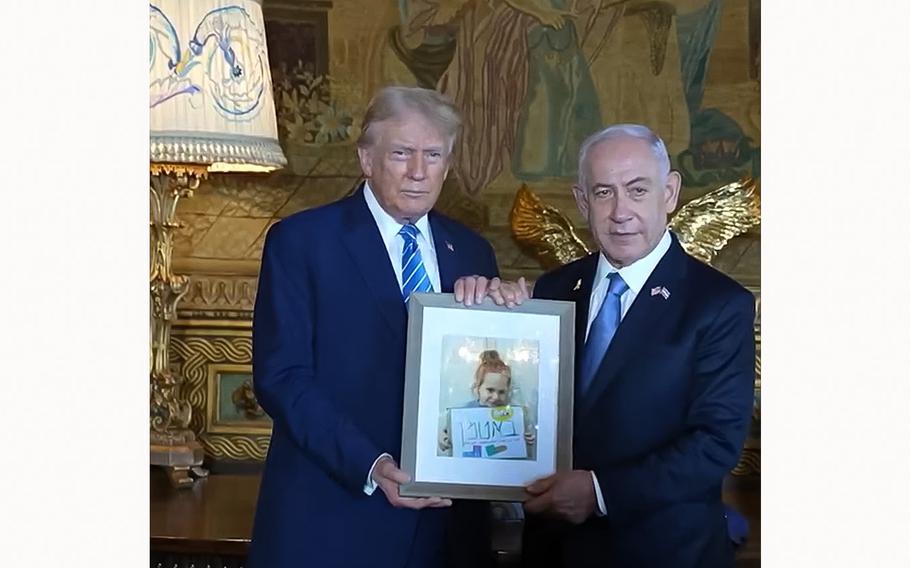
A video screen grab shows former President Donald Trump and Israeli Prime Minister Benjamin Netanyahu holding a framed picture at Trump’s Mar-a-Lago estate on Friday, July 26, 2024. (X)
(Tribune News Service) — Prime Minister Benjamin Netanyahu got a warm greeting Friday from Donald Trump at the start of their meeting in Florida, less than a day after the Israeli leader received a not-so-veiled rebuke from presidential candidate Kamala Harris in Washington.
“I’m honored, come on in,” Trump said as he greeted Netanyahu and his wife, Sara, at the top steps of the gilded foyer at the former president’s Mar-a-Lago estate. Trump clasped hands with Netanyahu, pulling him in close, and flashed a thumbs-up for the cameras.
Netanyahu traveled to Mar-a-Lago looking to patch things up with the once and possibly future president and rally Republican support for his plan to press ahead with the war against Hamas. Trump was furious in 2020 after Netanyahu congratulated Joe Biden on his victory in an election that the ex-president claimed was stolen.
The greeting suggested Trump might be willing to give up the grudge, at least for now. But he may be less inclined to let Netanyahu off the hook over the war. Even Republicans, who have been far more sympathetic to Israel’s war against Hamas than Democrats, have acknowledged the growing concerns about the rising death toll in the Gaza Strip.
Early Friday, Trump wrote on social media that he looked forward to greeting Netanyahu but was looking “even more forward to achieving Peace in the Middle East.” He posted a letter he received from Mahmoud Abbas, the head of the Palestinian Authority in the West Bank, and a frequent target of Netanyahu’s scorn.
Trump has said Israel should be allowed to “finish the job” against Hamas, but he told Fox News in an interview “they are getting decimated with this publicity.”
The equivocal statement from Trump, along with the less-than-wholehearted backing Netanyahu got from Democrats this week, highlighted how the trip to the U.S. — meant to bolster support for the war — risked isolating the Israeli leader even more. He scheduled the visit in what seemed like a different era — before the assassination attempt against Trump and Biden’s decision to cede to the Democratic nomination and endorse Harris.
U.S. leaders are now laser-focused on the election and political pressure around the war is mounting. Trump hasn’t given the backing he craves and Harris has been more willing to speak critically about Israel’s conduct than Biden.
After her meeting with Netanyahu on Thursday, Harris said she had “made clear my serious concern about the dire humanitarian situation” in Gaza. “It is time for this war to end,” she said.
Netanyahu and top aides fear that Harris’ comments about Palestinian suffering could drive Hamas to harden the terms of a hostage and cease-fire deal, according to a senior Israeli official who asked not to be identified discussing private conversations. Israel hopes her statement after meeting Netanyahu on Thursday won’t be interpreted by Hamas as evidence of a gap that could make a deal more remote.
After the meeting, far-right Israeli cabinet minister, Itamar Ben Gvir, who bluntly came out and endorsed Trump for the presidency earlier this week, wrote on X: “There will be no truce, Madam Candidate.”
With momentum building in her bid to challenge Trump for the presidency, the meeting with Netanyahu was a chance for Harris to reassure pro-Israel voters — and she did pledge firm US support for Israel’s security — while also presenting her with an opportunity to send a message to progressive voters upset about rising civilian casualties.
While the formal White House statement about her meeting with Netanyahu reflected official language on the administration’s Middle East policy, Harris’ sharper tone and more poignant imagery about the suffering in Gaza reflected what seems to be an ongoing attempt to distinguish her stance on the Israel-Hamas war from Biden.
“How we talk about the issues is important,” former US Ambassador to Israel Thomas Nides said. “She’s a bridge to the future. She’s going to articulate the need for a strong security relationship with Israel, but we need to articulate that this fight is not with the Palestinian people but Hamas.”
Amid ongoing protests from progressive Democrats and younger voters upset about the war in Gaza and civilian casualties, the Biden administration’s Middle East policy could act as a drag on Harris, who has mostly focused on domestic issues throughout her career.
Dozens of Democrats boycotted — and later criticized — Netanyahu’s speech to Congress on Wednesday, in which he mostly ignored the U.S. push for a cease-fire and hostage deal with Hamas.
In March, Harris called for an “immediate cease-fire” for six weeks to facilitate a hostage deal while speaking in Selma, Alabama, comments that — while hewing close to official policy — used language that was more critical of Israel’s conduct in Gaza than Biden.
But while there was a notable shift in tone from Harris starting in the spring, there has been no substantial change in policy since she started trying to distinguish herself from the rest of the administration, said Brian Katulis, a former U.S. official now at the Middle East Institute.
“She’s positioning, she’s changing the tone, she’s saying something different in tone but not in substance from what Biden says,” said Katulis, who has previously served at the White House and the State Department. “There’s a tone difference there, but the policy’s not that different.”
With assistance from Peter Martin, Stephanie Lai and Ethan Bronner.
©2024 Bloomberg L.P.
Visit bloomberg.com
Distributed by Tribune Content Agency, LLC.